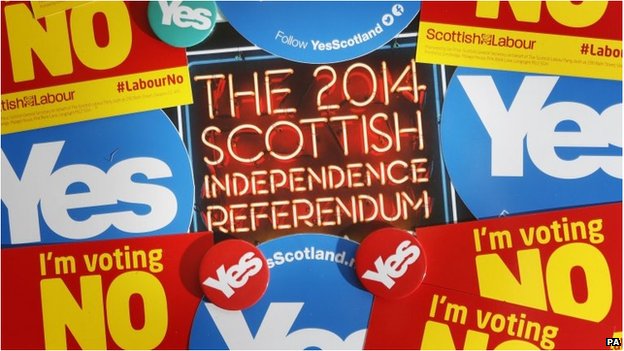Scotland and the UK: No means No! Or does it?
November 8, 2014
Scotland and England have been neighbors and military allies for over three hundred years they championed two World Wars together and share many cultural similarities. In light of this shared history and companionship, it is no surprise that the referendum election in mid-September did not pass and the two did not separate. However, just because ‘no’ was the final answer doesn’t mean that is the final word on the subject. Only a 55% (BBC) majority won to not separate, with a staggering 44% (BBC) that still said yes, begging the question: why do they want to separate and what does it mean for them now that they won’t?
This is not the first time that Scotland has voted to separate itself from the Crown, although never before was it for complete independence. In 1979 and 1997 elections were held that granted Scotland its own parliament. During the twentieth century England experienced a collapse of its Imperialist power when most of its former subjects abroad gained their independence such as India, South Africa, Australia, and New Zealand. Scotland’s desire and efforts to separate are most likely provoked from these leftover anti-colonialist sentiments that proved successful for others but unfortunately not successful enough for them and the desire to have a separate global identity from the somewhat overshadowing association with England.
As for why most voted ‘no’: difficult separation attempts such as Ireland’s in the twentieth century made the task of separating so close to home seem pretty daunting and high-risk for violence. Most unionists who voted to stay with the UK wanted to avoid this and other potential problems that could arise from being independent. The biggest argument for why Scotland wouldn’t work apart from the Crown was the economic implications; without the British Pound, Scotland’s economy would likely collapse or go into severe decline and it is likely that Scots did not want to see another Greece.
It’s uncertain as to what it would take for a possible revote in the future to pass and Scotland to separate. Unionist sentiment within the country would have to break down and that is a much harder thing to take away from a people who identify strongly with British culture and way of life. In order for Scotland to be stable and independent enough to stand alone they would have to display more self-sufficient action economically and militarily. The kind of unrest and growing-pains this could create for the small nation may outweigh the good that could come from being independent.
As a college rooted in Scottish heritage PC takes pride in its connection to the “motherland” and their shared history. Many students and faculty from PC enjoy traveling to different parts of the UK every year either through maymester or study-abroad; however, significant changes in the political status of Scotland could change the experience for visitors and natives with possible inflation in prices and civil unrest. Even though they remain a small part of a larger whole that is the United Kingdom, Scotland still stands out as a unique and powerful country that offers rich history and beauty to the world.
BBC News Scotland. Scottish referendum: Scotland Votes ‘no’ to Referendum. 2014
http://www.bbc.com/news/uk-scotland-29270441





